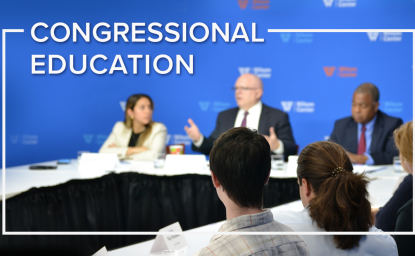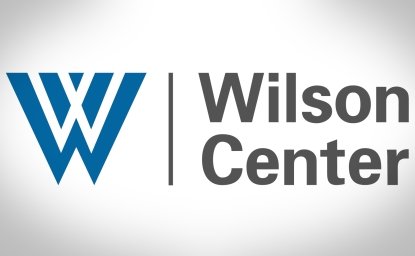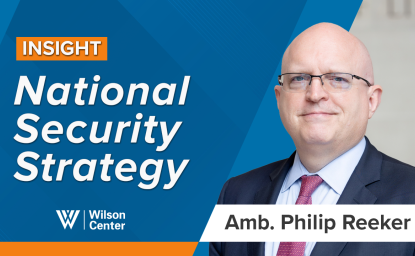The Latest
Ambassador Mark A. Green interviews H.E. Iván Duque Márquez about the Wilson Center's newest center, the Iván Duque Center for Prosperity and Freedom. It will emphasize the importance of the Western Hemisphere for both the US and the world through highlighting the challenges and opportunities the Hemisphere is facing.
Transcript
AMG: Welcome everyone to the Wilson Center. As you know, the Wilson Center is a unique institution–we're congressionally chartered, we're scholarship-driven, and we're fiercely nonpartisan and independent. As of today, we're also the proud home of the Duque Center for Prosperity and Freedom named after Iván Duque Márquez, President of Colombia from 2018 to 2022, a real leader in not only South America but globally on a number of issues. We're delighted to host this wonderful new center. Mr. President, it's great to have you with us.
IDM: Well, Ambassador Green, it’s such an honor for me now to see the Duque Center coming to action. As you know, it has been a great honor for me to be a distinguished fellow of the Woodrow Wilson Center. What we expect is that this Center becomes a permanent forum for ideas, proposals, debates, discussion of global issues, and, obviously, identifying viable solutions to many of the complexities that we face today.
AMG: You just captured it right. I think this work is important for people of the US because, as a friend of mine Bob Zoellick likes to say, “If you get the Americas right, much of the rest of the world will take care of itself from the US perspective.” But far more importantly, with the Duque Center, we're looking at how Latin America can help influence the world and what's worked in Latin America can translate to the world. Why is this important that the Center get launched now? What's going on in the world? What's going on in Latin America makes this timely?
IDM: I think as you rightly said, Latin America is part of the solution to many of the global challenges. We're not going to meet the Nationally Determined Contribution towards 2030 if Latin America and the Caribbean [don't] do well in terms of climate action, and primarily, in the protection of the Amazon basin, just to give you an example. So, Latin America is a solution to that.
The second thing is Latin America has to play a very important role when it comes to nearshoring and friendshoring because we share values of democracy, free markets, liberal economy. I think just the fact of being able to bring resources that were deployed somewhere else to the region will not only enhance the creation of new jobs but will also add a deterrent of massive migration to the US southern border just because this is going to trigger better opportunities for the people, so, I think that's also a very important element.
But third, I think, Latin America and the Caribbean [play] a very important role in terms of energy transition and the supply of energy to the world. If we connect those three elements with the rising middle class and the emergence of new technology companies in the region, we will see one of the fastest growing markets for FinTech, EdTech, AgriTech, you name it. So, I think those are just elements of why Latin America plays such an important and strategic role today.
AMG: So, I'm going to cheat and I'm going to mention, right here, your new book Our Future, and that, really, I think, symbolizes some of the work that we want to do, to me, the beauty of this Center, your leadership, and what we can offer. [There are] so many debates that have gone stale on the global stage right now; people seem to have gone to their corners and they're more shouting at each other than actually discussing issues. But you, in your leadership as President and your leadership in scholarship these days, you're really interested in breaking through those stale debates and trying to provide constructive innovative solutions to the future.
IDM: Well, I think what the book also tries to capture is that many of the things that are mentioned as steps that should be taken already have a success story, in the case of what we did in Colombia. When we talk about the expansion of protected areas, we were able to get to more than 30% protected areas in 2022, which was 8 years before the goal. We were also able to pass from literally 0.2% of our energy matrix in non-conventional renewables to 14% and counting. We were able to create a circular economy policy, create the National Conservation contracts where we are able to put in place market-driven nature-based solutions, or also what we did in terms of clean mobility or the promotion of green hydrogen and green ammonia. So, I think if we look at the 16 proposals that Our Future has of how can countries in Latin America and the Caribbean face the climate crisis that the world lives and become part of the solution, they're all viable if you achieve one thing: it's having leadership from the top down. That's one of the basic elements the book tried to put before the eyes of the people. If we have the right leadership, if we have the determination, and the willingness to put the political capital to achieve these results, those results are viable.
AMG: I think, as you point out, what's important about the book is not really the topics covered in the book but instead the fact that you're showing it can be done, that we can break through the stale debates, that we can construct collaborative answers. So, the same approach would work on migration, the same approach would work on trade, and on commerce. Here we're talking about, in your book you're talking about, an energy future a greener climate solution, but it really goes well beyond that.
IDM: As we have discussed many times, when we want to face the challenges of today, we have to think in a practical way. Kenichi Ohmae used to say this phrase, “Think globally, act locally,” so, we have to think globally in terms of the size of the challenges we face as humanity, but it all begins locally.
Many of the solutions that are here are combinable also with other elements, migration for example. We were able to bring 2 million Venezuelans to Colombia–with your support when you were in USAID–and you remember we took a lot of heat. Maybe many people said that's going to increase poverty, it's going to increase informality, it's going to increase multidimensional poverty. But in fact, if you have a good migration and you allow people to be visible, to enter the banking system, to enter the labor force, and to exercise rights, maybe with the exception of political rights, what we saw is that unemployment has been coming down since then. Multi-dimensional poverty has been coming down since then and informality has been coming down since then. Good policies that are based on evidence and management, they can certainly bring results; we have to de-ideologize many of those conversations.
The same thing happens when we think about trade because the best example in the Western Hemisphere–of a bipartisan, bicameral policy with a country–was the one that we faced in Colombia with the US since Plan Colombia began and then the Free Trade Agreement. When you look at what has happened in the last 20 years, Colombia was on the brink of being a failed state to becoming a member of the OECD. So, long-term bipartisan, bicameral policies can certainly create freedom and prosperity. Obviously, we still have challenges, but I think when we look at what has happened in the last 20 years, it's just a great example that must be followed in the relationship with other countries.
AMG: The Duque Center for Prosperity and Freedom talks about the right principles, the right leadership, and the right solutions for our future. We're very proud to host the Center here, there's so much work to get done, and we hope you'll all follow us closely and stay tuned. Thank you.
Guest
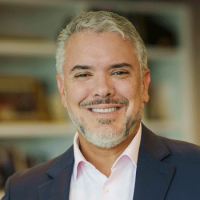
President of the Republic of Colombia (2018-2022)
Moderator

Explore More
Browse Insights & Analysis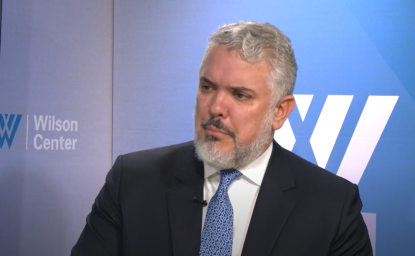
Wilson Center Launches Iván Duque Center for Prosperity and Freedom

Greenland’s New Governing Coalition Signals Consensus

